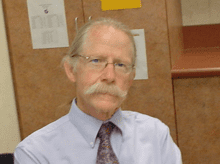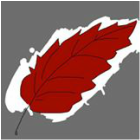 Rick Hartwell is a retired middle school teacher (remember the hormonally-challenged?) living in Southern California. He believes in the succinct, that the small becomes large; and, like the Transcendentalists and William Blake, that the instant contains eternity. Given his “druthers,” if he’s not writing, Rick would rather still be tailing plywood in a mill in Oregon. He can be reached at[email protected]. INTERVIEW WITH RICK HARTWELL Welcome to Scarlet Leaf Review! Q: Tell us a little about yourself and your background. I was in the military for twelve-plus years then left for my wife and I to take care of our disabled daughter; she’s turning forty this year and still lives with us. I then worked in telecommunications for sixteen years, was laid off and went back to school to get my teaching certificate. I then taught 7th and 8th grade language arts and reading for some seventeen-plus years and retired in 2010. Q: Do you think that your school years have had an impact in your writing career? If so, what were you like at school? I was a hood, no doubt about it: white tee-shirt with a pack of Pal Malls rolled up in the sleeve, blue jeans, white socks, and black penny-loafers; it was the early sixties. Never did homework and was an alcoholic. However, I stealthily submitted poetry to one of my English teachers; so much for an image. Q: Were you good at English or like Einstein you excel now in a field that was a nightmare for you as a student? Yes, I was very good at English, but mostly because I was an avid reader, not because I really applied myself. I also had four years of mechanical drafting – way before the use of CAD/CAM – as an elective and loved the challenge of clean lines and detail; can’t reconcile this with writing but oh well. When I finally went back to college, I received a B.A. in English Literature and eventually a M.A. in English. Q: What are your future ambitions for your writing career? I have been associated with the Inland Area Writing Project, University of California, Riverside, since 1999 and support their efforts. Poetry, essays and short stories are my focus. I would love to have some poetry collected and published in book form. Q: Which poets have inspired you and how? What was their impact on your work or your literary perspective? Blake, Rimbaud, Thoreau (yes, he was a poet!), Whitman, Ginsberg, Carver (from whom I was fortunate enough to take a class in poetry at California State University, Santa Cruz) – these were all early influences and their eclectic approach undoubtedly influenced me. Perhaps out of favor now, but the Transcendentalists led me to try to describe the minute detail as representative of the larger, universal whole. Q: When did you decide to become a poet? What was the decisive factor or you just took a pen and starting writing poems? I was a typical “hidden poet” in high school, but then lay fallow until after I left the Army. I then returned to journaling and writing in college and particularly when I started teaching; perhaps the hormones floating around middle school prompted a resurgence in my poetry! Q: Do you write full-time or part-time? Do you have a special time to write or do you write every day, 5 days a week or as and when? I am an avid journalist, so I guess I’d consider that writing daily. I then extract from my journal to “create” poems. I think I was greatly influenced towards this approach when I did my Master’s thesis on The Wild Not Less Than the Good: Henry David Thoreau as Transcendental Poet. Thoreau was a wonderful journalist and could often “lift” poems and full narrative paragraphs straight from his journal. Q: In your opinion, what is the hardest thing about writing? Revision, revision, revision! I often let a first draft alone for weeks before I come back to it. Q: Do you read much and if so who are your favorite authors? For your own reading, do you prefer eBooks or traditional paper/hard back books? I read perhaps a book a day on average, I admit that this often interferes with writing, except for the journal, and then will take a day out to review the journal. Hard to think of favorite authors without excluding someone that I previously read to excess, but: Henry David Thoreau, George Eliot, Thomas Hardy, John Steinbeck, Ralph Waldo Emerson, Ursula K. Le Guin, Wallace Stegner, LeoTolstoy, Kate Chopin, V.S. Naipaul, Yasunari Kawabata, Octavia E. Butler, Edward Abbey, Aldous Huxl;ey, Thornton Wilder, Evelyn Waugh, George Orwell, Albert Camus, Mary Doria Russel, Nikos Kazantzakis, Sarah Orne Jewett, James Ramsey Ullman, Willa Cather, Phillip K. Dick, Pearl S. Buck, and so on; I have often latched onto an author and read their oeuvre to e exhaustion. If you notice any pattern, let me know because I certainly don’t. Q: Do you let the book stew – leave it for a month and then come back to it to edit? Definitely! This is a must for me. Q: What is your favorite book and why? I would have to say Thoreau’s Walden and Emerson’s Collected Essays. I’ve reread both so many times I have lost count. Q: What is your favorite quote? When hate is in the seeds, you can only harvest weeds. Ernst Jünger, The Glass Bees In joined hands there is hope; in a clenched fist, none. Victor Hugo, Toilers of the Sea An eye for an eye only ends up making the world blind. Mohandas Gandhi, The Mahatma Thank you very much for taking the time out of your busy schedule to take part in this interview.
0 Comments
|
ISSN 2369-8446
To bring joy to readers everywhere. Archives
June 2023
Categories
All
http://roxananastase.weebly.com/
|


